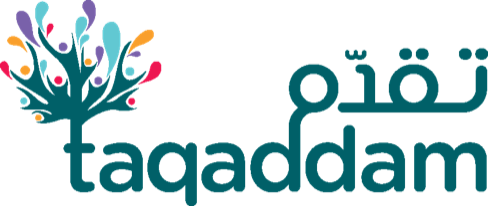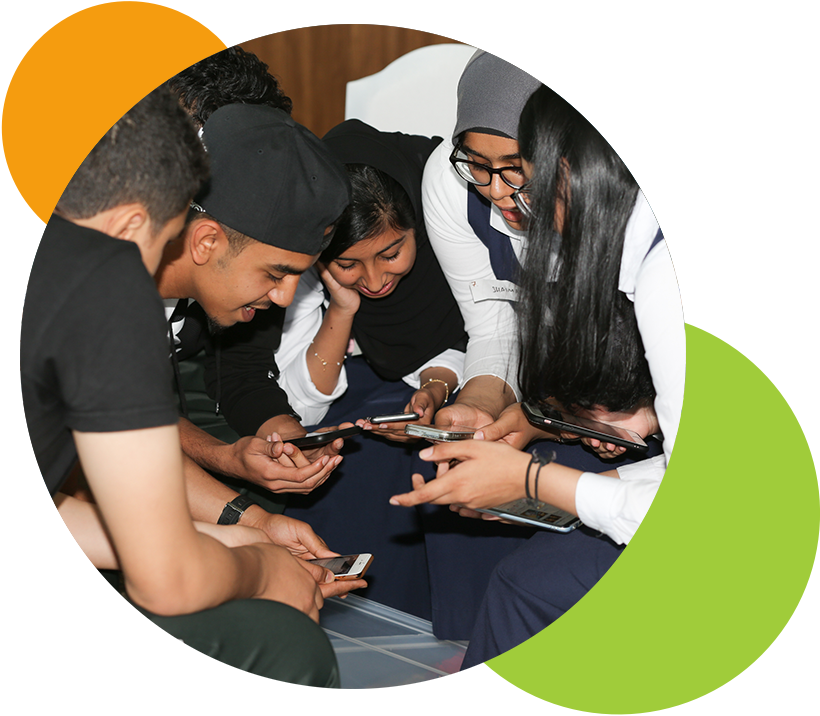What is Taqaddam?
Taqaddam is a Life Skills programme for young people in the Middle East and North Africa (MENA). Taqaddam, Arabic for ‘moving forward’ supports young people to move forward with confidence into the future with the skills they need to flourish in life, work and society.
Aims
Taqaddam helps develop the character strengths and soft skills they need to flourish in life and work.
Increased self-awareness
Greater sense of confidence in themselves and their future
Increased capacity for creativity, critical thinking and collaboration
Greater confidence and capacity for social leadership and action
Greater ownership, skills and tools for ongoing personal development
Who is the programme for?
Taqaddam is primarily aimed at 15-16 year olds, transitioning from school to the next stage of their lives.
According to a host of scientific studies, adolescence is the perfect time for children to be exposed to experiences that will help them develop and reflect upon their social, emotional and life skills. These experiences help their brains develop in ways which support greater confidence in themselves and their futures.
Although the programme is primarily designed for teenagers in the MENA region, people of all ages and nationalities can benefit from Taqaddam.
Why is Taqaddam needed?
Life skills are for young people’s personal, professional and community lives.
Today’s young people are living in an increasingly complex and challenging world. Globalisation and changing technology are bringing about significant changes in the workplace, where there is increased competition for work and a demand for higher levels of skills. This is having a profound effect on the fast-growing young population of the MENA region, where many young people are leaving education unprepared for this rapidly changing environment and facing the prospect of long-term unemployment.
Over the past two decades, educators, employers and policy-makers have focused increasingly on the development of life skills as a way to prepare young people for success. Recent studies have found that employers in MENA value a positive ‘soft skills’ and inter-personal skills highly in their recruits. However, the study also found that employers perceive new graduates as lacking confidence in their capabilities; in their ability to communicate effectively; to problem-solve; and to self-manage.
Taqaddam enables students to develop these essential life skills alongside fundamental personal strengths, envisaging a generation of socially and emotionally resilient young people who feel equipped for life, work and society.
What does Taqaddam aim to achieve?
We want students to leave the programme with:
Increased self-awareness
Greater sense of confidence in themselves and their future
Increased capacity for creativity, critical thinking and collaboration
Greater confidence and capacity for social leadership and action
Greater ownership, skills and tools for ongoing personal development
Ultimately we hope to:
provide young people with an opportunity to develop personal skills and capabilities that will enable them to successfully transition from school into the next stage of their lives.
engage with young people in ways that build their confidence and enable them to develop as effective and responsible citizens, and also as successful lifelong learners.
raise the aspirations of young people in order to stimulate and increase their motivation to embrace change.
Who created Taqaddam?
Taqaddam programme content is developed and brought to you by HSBC and the British Council.
How is Taqaddam delivered?
The programme has four main components:
Student workshops – bringing together groups of up to 80 students from across the country, led by facilitators from the UK and the MENA region
Life skills classes – delivered in schools by teachers who are trained and supported by the Taqaddam team
Personal Missions – self-directed missions in the Taqaddam Handbook prompting action, reflection and connection
Team projects – students designing and piloting social action ideas and presenting them at an annual national showcase event, ‘Make It Happen’.
What are ‘Life Skills’
Life skills are simply: all the skills we need to make the most of life. Different combinations of these life skills are also referred to as soft skills or 21st Century Skills
In Taqaddam, we focus on some of the personal and interpersonal attitudes and abilities that play a critical role in the ability to learn, connect and adapt to make the most of life’s opportunities. Together with greater self-awareness, a connection with their life skills supports young people to engage with the world more confidently and in a deeper and more meaningful way.
We take a holistic approach, but explore three life skills in greater depth: creativity, critical thinking and collaboration. These ‘3Cs’ have been prioritised because they are recognised as central to personal well-being, employability and positive engagement in society. They are also interconnected with, and provide effective entry points into, many other life skills.
Critical Thinking – the ability to analyse and evaluate the world in order to form judgements, develop ideas and think for yourself.
Creativity – using the imagination to explore the world in new ways, create something original and express yourself.
Collaboration – connecting effectively with others and using the skills and abilities of multiple people towards a common purpose.
Life skills have been proven to positively impact young people’s personal, professional and community lives.
What countries are taking part?
In 2019/20 seven countries across the MENA region are participating in Taqaddam. These countries are UAE, Egypt, Bahrain, Kuwait, Qatar, Oman and Morocco.
How long is the programme?
The annual programme differs from country to country, but usually covers an eight to ten week period, from the first workshop to the final Make It Happen event.


